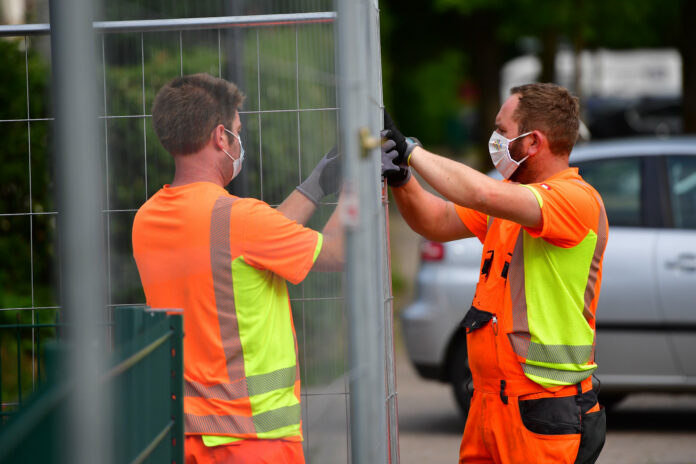Members of the technical emergency service secure an area within an apartment complex used by the Toennies meat company to house labourers from eastern Europe during the coronavirus pandemic on June 20, 2020 in Verl near Guetersloh, Germany.
Alexander Koerner
A district in Germany where there has been an acute outbreak of coronavirus cases at a meat-processing plant is being put back into lockdown, the premier of North Rhine-Westfalia said Tuesday.
State premier Armin Laschet said he was putting the district of Guetersloh, home to around 360,000 people, back under lockdown until June 30. The move comes after at least 1,000 workers at a meat processing plant in the area contracted Covid-19.
Bars, museums, galleries, cinemas, sports halls, gyms and swimming pools in Guetersloh will now be closed, and picnics and barbecues prohibited, according to Reuters.
Germany was lauded throughout the coronavirus crisis in Europe as a country that had seemingly managed to control the virus’ spread, largely through an organized and early contact tracing system, and to have kept the nationwide death toll relatively low.
Now, however, the country has seen a resurgence of cases due to several localized outbreaks in different parts of the country. The surge in infections prompting the reproduction or ‘R’ rate (which refers to the number of people that an infected individual goes on to infect, on average) to jump to 2.88 at the weekend (it had come down to 2.76 on Monday, and is a moving 4-day average which reflects infection rates about one to two weeks ago). Experts want to keep the R rate under one to be able to control and slow the spread of the virus.
The Robert Koch Institute for infectious diseases, collating Germany’s coronavirus data and reporting a further 537 cases Monday, bringing the total recorded to 190,359, said that outbreaks primarily in North Rhine-Westphalia and Lower Saxony are primarily responsible for the increasing case numbers.
The RKI said that as well as outbreaks continuing to be seen in nursing homes and hospitals, outbreaks have been reported in several German states “including in institutions for asylum seekers and refugees, in meat processing plants and logistics companies, among seasonal harvest workers and in connection with religious events and family gatherings.”
The biggest contributing factor to the surge in cases has been an outbreak at the meat-processing plant in Guetersloh in North Rhine-Westphalia, the state with by far the largest amount of coronavirus cases, with over 41,000, according to RKI data.
Over 1,000 employees at the factory, the largest such plant in Europe and run by German meat giant Tonnies, tested positive for Covid-19, the RKI said Monday. Some reports suggest more than 1,300 people are infected at the plant, where around 7,000 people are employed.
The Toennies meat packing plant stands during the coronavirus pandemic in Rheda-Wiedenbrueck on June 19, 2020 near Guetersloh, Germany.
Sascha Schuermann
The plant was promptly closed and all employees (mainly Bulgarian and Romanian workers) quarantined, as well as their household members, as the authorities feared a rampant spread of the virus. All schools and day-care centers in the district were also closed and will remain so until mid-August.
Nonetheless, the outbreak at the meat-processing plant has caused a furor in Germany, with the country’s Labor Minister Hubertus Heil saying Sunday that the meat processing company should pay damages, according to public broadcaster Deutsche Welle.
“There must be a civil liability of the company,” Heil told a Bild online broadcast, Deutsche Welle reported, with Heil reportedly adding that the company had “taken an entire region hostage” by the company, that he accused of violating the coronavirus restrictions.
The head of the meat processing firm, Clemens Tonnies, took to Twitter on Sunday, saying that the company “accepts its responsibility” and that it would pay for coronavirus testing in the Guetersloh district but he refused to step down following the crisis.
The outbreak at the plant has put a spotlight on working conditions within the meat processing industry in Germany, but it is not the only area that has seen a rise in cases.
The RKI said Monday that a large Covid-19 outbreak in the district of Goettingen in Lower Saxony was traced to family gatherings and another, in Magdeburg in the state of Saxony-Anhalt, emerged in several schools that are now also closed. In Berlin, an outbreak there of 85 cases has been linked to members of a religious community.






